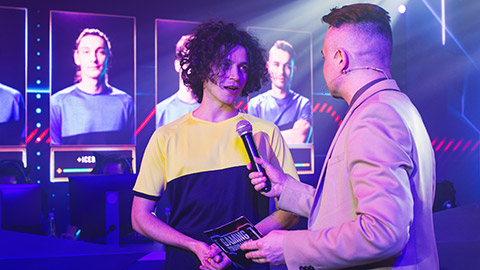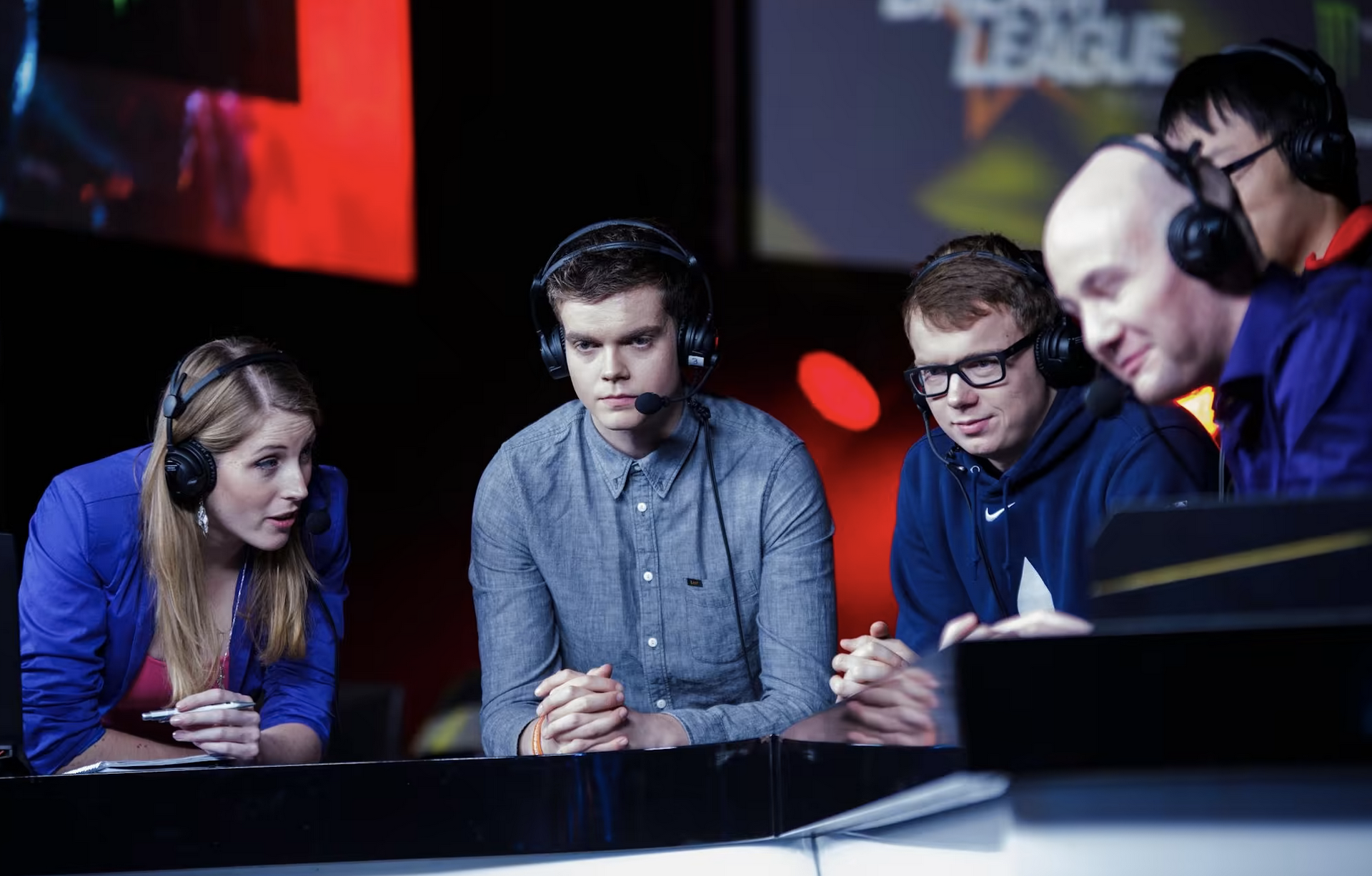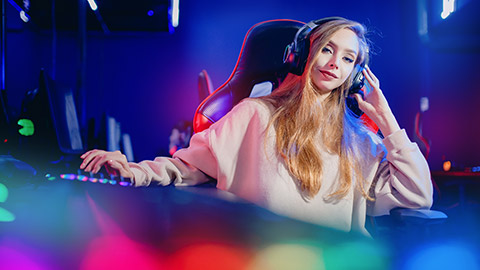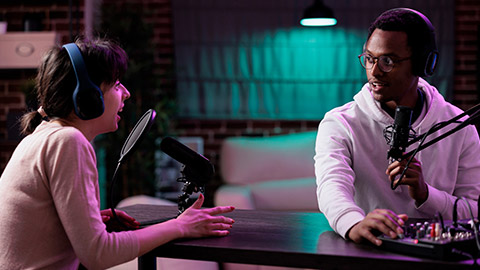While the acting is a passion, hosting is funVarun Sharma
Let's travel back in time to ancient Rome. The Roman games, better known as Ludi, were hosted in the roman Flavian Amphitheatre or Roman Colosseum as we now know it. There were spectacular shows, including the infamous gladiator fights. These fights were a display of Rome's total hegemonic power, bringing talented fighters from across their empire with the sole purpose of entertaining the crowd.
These spectacular shows would always take place with a host. The Host was a well-known person who was loved by the crowd and shared their passion for the games. The Host’s responsibilities were simple and played a big part in the events. The Host would introduce the all of the competitors who set foot in the arena of the colosseum. The Host would single handily elevate the crowd’s wonder and interest, sparking hope and empathy. It connected the gladiators with the crowd and made fighters champions- the Host knew he was not selling the fight, he was selling the entertainment.
Michael Buffer is one of the most famous sporting announcers in the world and is most commonly known for the infamous “Let’s get ready to rumble!” line he quotes before a major sporting event.
The following video provides an example of Buffer introducing competitors and the response received from the crowd. While hosting has evolved over time, the concept is the same: make for an exciting experience for the audience!
Watch: Michael Buffer - Let's Get Ready To Rumble (1:00 minutes)
In this video, Michael Buffer gives a live masterclass on how to engage with the audience builds momentum and get all the crowd activated.
In eSports, the Host of a production attempts to do the same thing. They set up and guide the show. The goal is to hype the audience and make them feel invested and part of the show.
Host skills
As a host, you can develop some specific skills over time. Some of these include:
- Active listening
- Non-verbal communication skills, such as body language
- Communication skills.
- Empathy
- Self Confidence
- Charisma
- Flexibility
- Humour
- Politeness
- Improvisation.
A good host encompasses these skills and more. They allow the flow of the show to be smooth through their expertise of these skills.
Host Hot Tips!
Let’s take a look at some of the tips that should be considered as a host.
The look
Now we don't need to look perfect, but reflecting a good image of ourselves and the event is essential. Images are very important in the entertainment industry, and it's no different in eSports. Think of a host you know; this can be within eSports or even a news presenter. Think about how they present and carry themselves during the show; they make it look easy, and you need to do the same.
The feel
Learn how to channel your passion for eSports into what you say, learn how to read a room and be prepared for different outcomes. This is where a lot of the on-stage skills show. Having these skills will make you a great host in no time.
YOU SAY
Always be ready and prepared. Have written rehearsals that are practised before you step out on that stage. It is no different to doing a presentation. It would help if you practised determining the best way to get your point out.
You Practice
The final tip to improve once you get started: Vod review. Just like how players do, the best way to learn and improve is by watching yourself back. Write down notes on where you could improve.
Portfolio Checkpoint: 3A: Case Study
Frankie Ward has covered multiple game titles and many big tournaments. She has been nominated for eSports Host of the year multiple times while hosting various games in various genres, showcasing her flexibility and knowledge as a host.
We have looked at a snippet of Michael Buffer introducing a wrestling event. Let’s take a look at Frankie Ward in her element of eSports.
Here are a few clips of her doing multiple roles in different events. Notice how she carries herself in these other clips depending on her role within the broadcast. In your portfolio, write down the difference between each clip and how it influenced the show.
Watch: Frankie Ward – esports host (2:54 minutes)
This video features Frankie Ward and summarises the contrast in her persona on stage, desk and sideline. For her amazing performance, she was then nominated in 2019 for Host of the Year at the eSports Awards.
Watch: Eefje 'Sjokz' Depoortere: Life of a League of Legends star | Esports Unfold (6:01 minutes)
In this video it's down how Sjokz uses the growing eSports scene to become one of the best entertainers in the industry.
Try it out on a teleprompter!
Now that you understand the skills required for hosting let’s put them into practice. It is time to get used to talking in front of a camera. We will do this using a teleprompter.
A teleprompter is a device that displays text on a screen or monitor. It allows a speaker or performer to read from it while appearing to be looking directly at the audience or camera. It is commonly used in the entertainment industry for television news broadcasts, political speeches, and television shows where hosts or guests need to deliver lines or scripts accurately and seamlessly.
Fun fact!
Did you know, teleprompters can be both physical and digital?
Portfolio Checkpoint: 3B: Host practice with a Teleprompter
Using a teleprompter, create a short script as a host and record yourself on OBS. (1 minute maximum)
Access the following website to make your recording.
Free Teleprompter Software - Voice Activated Online Teleprompter [2023] (telepromptermirror.com)
Add this to your portfolio.
Technology and the impacts on remote eSports events
In our technologically evolving world, it is essential to consider how technology can change the way remote eSports events are held. One of the key skills for a host to encompass was eye contact, but how can this be achieved when you are not in front of a live audience? During your host recording, did you have trouble maintaining eye contact?
Let’s look at what NVIDIA has recently created, which can be a game-changer for casting remotely.
Watch: NVIDIA Broadcast 1.4 Update Featuring Eye Contact (0.32 minutes)
This video contains footage from NVidia's Broadcast product, it features the new updates for their software and how future technologies will be integrated soon to this platform.
PORTFOLIO CHECKPOINT 3C: Host/Presenter: “Mission Possible”
Choose the size of the eSports event you will be hosting:
- Small (S) e.g., highschool event
- Medium (M) e.g., ametuer university club event
- Large (L) e.g., professional event.
After you choose the event size, define the differences between the three event sizes when it comes to Image, Technical, and Expectations. Mention at least one main difference per size:
The difference in Image (What the event should look like / how you present yourself as Host/Presenter and present other event participants)
- S
- M
- L
The difference in Expectations (What everyone is expecting from your performance)
- S
- M
- L
Based on your event size selection (S/M/L) record a one-minute video doing a proper introduction and then a one-minute video for an event closure. These must be recorded with a microphone and camera:
Event Starting (Introducing the Event, introducing yourself, what’s coming, an original message to the casting desk, welcome message) Paste the URL code of your video here:
Event Finishing (summary of what the event was like, thanking the viewers, sponsors, and publishers followed by a proper goodbye message) Paste the URL code of your video here:

An interviewer's goal should be asking the right questions and getting the right answersAnonymous
Interviewing is a skill anyone can learn and continuously improve. You will see a common theme of being flexible within eSports and the huge advantage it is over others in the industry to be able to cover multiple roles and do them well. Once you have established the on-stage skills we just went through, the interview transition can be very smooth. The most critical skill is asking thought-provoking questions that will give the viewers insight, making the production more exciting to watch and coming up with good follow-up questions that relate to the interviewee's answer.
Interviewer skills
Let’s look at some of the skills you develop as an interviewer.
- Verbal communication skills
- People management/people skills
- Emotional intelligence
- Game knowledge time management
It is essential to realise that players are not always media trained. They do not have all the skills you have learnt, so being aware and mindful of that is critical to the role of an interviewer. This again leads us into the vital skill of being adaptive within interviews. Adaptability is essential because you need to be able to gauge how a player may respond or react to questions (or be interviewed) and make them feel as comfortable as possible on the stage.
Each player will give an interview differently – so being able to adapt how you ask your questions or how much direction you give them within the interview is critical when it comes to creating authentic content. Sometimes giving the players a platform after they just won or lost to say their thoughts and let them carry the conversation is key and knowing when to do that is a skill you will learn with time.
Let's take a look at an interview carried out by Sjokz.
While watching the interview, look at how Sjokz asks the questions and respectfully nods in response to the disappointment being shared by Faker. Sjokz demonstrates a calm presence, she allows Faker to share his thoughts on what happened all while giving an interview and asking great questions. Notice the length of the interview, it is relatively short even with the translator. This shows her class and expertise after a loss and she recognises that players don’t typically want to be in front of the camera for a long interview.
Watch: Faker: "We hope to do better in the future" Finals Postgame Interview | Worlds 2022 (2:01 minutes)
This video reflects the professionalism behind interviewing a professional player. Sjokz, a well-known face of eSports interviews Faker. Being probably the most recognised eSports persona, this is a hard task, especially after a loss during an important match.
What do you remember?
Interviewer hot tips!
Let’s take a look at some of the key tips to remember as an interviewer.
Schedule all your interviews
Make an appointment with the player or team. Usually, teams or players have a tight schedule and must make time by appointment. Make sure that you respect the time frame of your request.
Create a list of good and meaningful questions
Brainstorm a list of possible questions and then select which ones would be beneficial to have in the interview. Have a mix of easy, medium and hard questions.
Structure your interviews
Have a chronological order or a desired sequence that the audience and the interviewee could follow up. Build momentum and know when the right time is to ask a question.
Prepare the interviewee before the interview
Most people need time to prepare, so you must present the opportunity for the interviewee to read the questions before conducting the interview. Giving them the questions may ensure a more professional response from the interviewee and a better answer for the audience.
Empathise with your interviewee
Be ready to drop questions that may be too sensitive to answer. Adapt questions so your interviewee receives validation by the audience.
Tips for being interviewed
Now that you have the interviewing tools, we will look at this from the opposite perspective: when you are being interviewed. The following are some tips you can consider when you are being interviewed.
Be prepared
Ask for the questions in advance and practice.
Be on time
Your time on stage is everyone's time on stage. Be respectful to your Host and viewers.
Be concise
Only elaborate on a subject if you are asked. Simple is better.
Be Professional
Try not to get things too personal. The interviewer is frequently lacking in-game context, and so as your audience.
Be Eloquent
Try not to stumble or fill in gaps with “Um” or “Ahm”. Instead, take your time to talk, pause and then keep talking.
Time to practice what you have learnt!
Portfolio checkpoint 3D: Interview Practice
Interview practice
Let's set the scene. You ask a player how they are settling into their new team and how the practice has been going – What are some potential follow-up questions you could ask, anticipating what they might say in response to your original question?
Follow up activity
The player responds unexpectedly and instead talks about what they did in their break. This means your follow-up question no longer fits the interview. Think of two (2) different things you could say and explain why you chose to say that.
Online meetings
In some circumstances, you may need to facilitate an interview online. One way this can be achieved is through google meetings.
Watch the following video on using Google Meet.
Watch: How to Schedule Meeting on Google Meet| One link for multiple meeting (2:16 minutes)
An eSports tournament takes more than just great players to be successful. The personalities and behind-the-scenes action offer audiences and fans a truly memorable event. So, with that in mind let’s start understanding a few of the roles it takes to pull off a tournament with all the hype and buzz that keep spectators returning for more.
PORTFOLIO CHECKPOINT 3E: Interviewer: “Tell me who you are and I’ll double check that info”
If you are working as an interviewer in the eSports scene, whom would you like to interview and why. Describe the background of your decision.
- Who:
- Name:
- IGN/Nickname:
- Background:
- Accomplishments:
- Why (Why would you like to interview him/her):
- Personal perspective:
- Professional Perspective:
Imagine you had the chance to do your dream interview and ask five relevant questions to the inter-viewee. Questions must be structured for a fluid and swift conversation. (This should not take the interviewee more than 5 minutes). Consider tips for a good interview.

Giving credit where credit is due is a very rewarding habit to form. Its rewards are inestimableLoretta Young
In eSports, there are many amazing plays made by the skill and experience of eSports athletes. But for these to be immortalised and remembered by the community, they need validation of the play's brilliance. They need the hype that the moment deserves- to achieve this, they need epic shoutcasting!
Shoutcasting is one of the noblest professions in the eSports world, it is to make others shine while you take a step back and admire how great their process of mind is.
The following video outlines the art of Shoutcasting and story behind the voices of eSports.
Watch: What is Shoutcasing? The Story Behind The Voices of Esports (15:11 minutes)
Types of shoutcasting
Casting can be done by one person, but it is always good to have a second opinion to create a good audience dynamic and bounce ideas off. This is why we have...
Primary types of shoutcasting
Shoutcasting can be separated into two primary types:
- Play-By-Play (PBP) casting
- Colour casting.
Play by Play
The play-by-play casters are the ones creating emotion during the action. They are the ones whose voices we remember in big plays made by players. Their sole responsibility is creating a story and highlight important moments with the emotion that they deserve.
Here are some common 3 PBP Casters to watch from the League of Legends scene:
- Trevor “Quickshot” Henry
- Clayton “CaptainFlowers” Raines
- David “Phreak” Turley
Colour Casting
The colour casters oversee the analysis behind the plays. They are the ones explaining to the crowd what's happening on the map and will try to predict incoming action and the reason behind it.
Three Colour casters to watch from the League of Legends scene:
- Joshua “Jatt” Leesman
- Marc ‘Caedrel’ Robert
- Sam “Kobe” Hartman-Kenzler
These two types of casters often work together (Duo-Cast) to tell the story of the game. If there is only one caster it tends to be a PBP caster who also needs to include some of the information a colour caster would bring to the game.
Developing caster skills
The following are some of the skills you will need to develop to become a successful caster.
- Flexibility
- Story Telling
- Eloquence
- Showmanship: draw the attention of an audience to achieve a desired result such as entertaining or informing (copied from simplicable.com)
- In-game Knowledge
- Self confidence
- Empathy.
Now that you have a better understanding of the different casting types you can consider if you have the desire and dedication to take on one of these roles. The world of shoutcasting is very competitive and takes time to master so make sure you’re passionate and ready to put in the hours.
PORTFOLIO CHECKPOINT 3F: Shoutcaster: “Talk the talk but walk the walk” or “Operation Copycat”
Write about who is your favorite Shoutcaster and why. Your writing must be 200 words minimum. Insert writing:
Then answer the following questions
- What type/style of caster should this person be considered? Choose between Color cast-ing or play-by-play. Elaborate on a quick explanation of your answer and justify it.
- How long has this person’s career been on the professional scene and how long did it take them to get there?
- If you had to summarise their casting style how would you describe it?
Now to business! Let’s have some fun. We want you to replicate your favorite casting style that matches your favorite shoutcaster! Record yourself in OBS for 30 seconds using the same emotion and technique that your favorite shout caster would use. The recorded video must have video and sound. Add your response to your Portfolio.

When learning something new, we have to start from somewhere. Let’s try a fun activity. But before we do, we will take a short break from the reading and watch the following video.
Watch: Heart Attack Inducing Base Race (KT VS IG) - 2018 World Championship (1:20 minutes)
In the 2018 Worlds Championship, KT Rolster barely came to a win after defeating their Chinese counterpart IG (Invictus Gaming) on an extremely close base race.
Watch: Shoutcasting activity: (2.05 minutes)
Did you notice the difference between both video attempts? Shoutcasting, like any other skill, requires practice. The more you practice the better results you will get with time, as the old saying goes, practice makes perfect.
Whenever you are trying something new for the very first time it is normal it may not turn out as successful as you would like, especially on the first few attempts. But don’t be too hard on yourself, everyone will fail many times before they get it right. Failing is a vital part of learning, and so maybe, we should look at failure through a different lens. Maybe we should see it as a benchmark of our past selves and use our next attempts to measure our progress.
Shoutcasting- what not to do
Once you are all set up and to take the eSports world by storm it’s time to start perfecting your shoutcasting skills… but let’s face it… it’s more than likely your first few broadcasts may be a little on the rusty side. It is important you are prepared (mentally) for the likelihood of mistakes and running into problems. So here are a few pitfalls bought to you by one of the world’s first eSports broadcasters, Paul ‘ReDeYe” Chaloner. Chaloner hones in on some of the key things to avoid when you are in the initial stages of your shoutcasting. Remember, setting good habits from the beginning will help pave the way to successful shoutcasting.
Let’s take a look at some of these tips of what not to do when it comes to shoutcasting.
Swearing
For many people swearing is often a common reaction to frustration and in the initial stages of shoutcasting, you may find yourself swearing… a lot! While it may be funny for some, (particularly 12 year olds who find swearing and profanities hilarious) swearing, is not likely to appeal to potential hiring prospects, so as best you can, avoid swearing whenever possible.
Calling the wrong play
When you first start out, it will be tricky getting to see each play made initial stages, mistakes are often inevitable. It is ok to recognise that a mistake was made. It is normal and after all, you are new. Over time and with more exposure, you will find your eyes will sharpen on various plays made throughout the tournaments making them easier to spot and easier to call.
Let’s take a look at some plays that were missed by shoutcasters.
Here is an example in League of Legends where a cool play was missed by the casters. As the PBP caster Drakos is casting, Caedrel calls Mersa coming in but misses the detail of Jankos smiting the minion to allow the hook to hit.
In the following video, we see Caedrels reaction to missing the call.
Watch: the GENIUS Jankos Play that you missed in LEC: (0.43 seconds)
Sometimes plays will get missed, and that’s okay if it doesn’t happen too often. Caedrel revisited an LEC play made by TH Jankos. He explained the brilliant thought process behind that play.
Over projecting
A common issue for new shoutcasters they often try to inject an almost false level of excitement by being loud at the wrong moments. Focus on being as honest through your coverage as you can and over time, you’ll understand when to project and at what points they are valuable that will warrant high levels of excitement.
Talking too much
One of the most common errors new shoutcasters make is talking too much. Learning the art of ‘dead air’ makes a powerful commentator, but we will get to that later. For now, just concentrate on taking a breath sometimes!
Casting heroes
As you become more and more familiar with the eSports world, it is likely you will connect with certain casters. You may like the way they speak, interact and respond to events and tournaments.
Watch the following video and consider which of the casters you identify and connect with.
Watch: The Top 10 Casters in Esports (25:21 minutes)
This video reflects a god-tier list of the most famous eSports casters in the genre. Their personalities reflect their unique value as shout casters and their trajectory to become legends.
Tips for being a great shoutcaster
A good voice certainly helps but the good news is anyone can practice and improve aspects of their voice and vocal abilities if they are willing to work hard. Remember gaming communities are some of the most diverse in the world and a one kind of voice isn’t going to please everyone.
Here are some skills Paul ‘ReDeYe’ Chaloner suggests every budding shoutcaster can work on to improve their voice.
Inflection
Inflection often refers to the pitch and tone patterns in a person's speech: where the voice rises and falls. It is important to figure out what you are saying and how you want it delivered. If you want to come across as more confident (for whatever reason), practice how to end a sentence on a downward inflection. If you want to use surprise in your voice or exude excitement, learn how to end the sentence on an upward inflection.
Projection
Projection refers to how you use your voice. Many people get confused between projection and volume, and the two are very different. Projection can help with improving volume, but its main purpose is to ease the strain on your voice while still allowing those listening to hear and understand you fully.
Enunciation
Enunciation is essentially how you speak, including the pronunciation of words. For successful enunciation, it sounds quite simple, but open your mouth wider when you are speaking/casting. It will help you enunciate much better, and if you find yourself tripping over words when talking quickly, opening your mouth and extending your jaw will help you with this.
You can also improve enunciation by concentrating on your breathing just before you start on what you think will be a long period of fast talking.
Remember that it isn’t just your mouth or your vocal cords but also your tongue control that matters when enunciating properly. If you work to keep it wider and flatter, this will also help.
You can also try standing up, something many of today’s commentators often do as this allows you to open your lungs wider and be more expressive at the same time.
Pacing
Depending on the type of game you cover, controlling the pace of the commentary can also help your voice. Speeding up and slowing down not only helps the flow of the commentary but also aids you in gaining control over your voice. It can inject excitement at the right time and through not only speaking fast at the right time but also knowing when not to talk at all.
Practice, Practice, Practice
We have said it before, and we will say it again- it is all about practicing, the more you do it the better you will be.
Raising the stakes- Preparing for a stream
The shoutcaster isn’t going to make the game great, that is up to the excitement of the game itself. However, an underprepared shoutcaster can make a great game a bad cast, and an average game even worse. Viewers are relying on shoutcasters to provide, information, stories and bring the virtual characters to life. To do this, the shoutcaster needs to put hours into research so he can share vital information with the viewers.
Is Shoutcasting for you?

Those who know, do. Those that understand, teachAristotle
The cool thing about great video games: they are easy to play but hard to master. You mix them with a fun to watch experience, a great community and BAM! You have eSports. A competitive scene in which only a few will try to step into. There may be a few who understand the complexity of the game but not on a professional level. It is safe to say then that eSports casual players outnumber the hardcore fans. Only the trained eye may understand the process of thought and decision making that professional athletes face in every game.
Often a position filled by former professional players, an analyst's job is to observe, identify, dissect, understand, and explain to the nonprofessional viewership what happened inside of the match. They should be aiming to deliver the most important information in a digestible way to the viewer.
Process of analysis
The process of analysis has been illustrated in the following inforgraphic.
Case study: LS
A diamond in the rocks and his pursuit for redemption and Greatness.
From cheating in Starcraft to becoming one of the most well-renowned names in eSports, LS or LastShadow has always risked everything for the pursuit of his passion. LS story of success has a rough start but a happy ending. The former professional Head Coach of C9 and T1 and LGBT advocate has currently disclosed that he may be in the spectrum for autism.
Watch: He Survived Cheating and Homelessness to Find Redemption in League of Legends (15:28 minutes)
From being considered a bad influence in the scene to becoming one of the most liked personas in the genre, this story talks about LS redemption as a coach for the competitive scene in League of Legends.
Developing analyst skills
Let’s take a look at the skills required to be an analyst.
- Inferencing skills- what is happening that
- Attention to detail
- Communication skills
- In-game knowledge
- Comfortable in front of a camera
Analyst hot tips
- Bring context to every dissected play
- Back it up with numbers. Statistics and KPIs or ratios should be pointed out and explained to help the process of hard to digest information
- Be objective. Be fair. Being non-partial when dissecting a play is a must.
VEED.IO for play analysis
Explore the play analysis tolls and share with your teammates.
Draw on Videos Online - Annotate Videos, Animations - VEED.IO
Watch: Canva for Analyst desk: (1.01 minutes)
PORTFOLIO CHECKPOINT 3G: Analyst Desk “The eye of the Storm”
Choose any footage from any genre of an eSports match that you feel comfortable explaining. URL LINK TO THE CHOSEN FOOTAGE:
Using OBS record yourself talking about the following of the selected footage: When it happened
- Identify the Key game changer play:
- Dissect the process of thought of the player to the untrained eye:
- Elaborate on how important this decision-making was for the overall outcome of the game:
- Elaborate on other possible outcomes:
